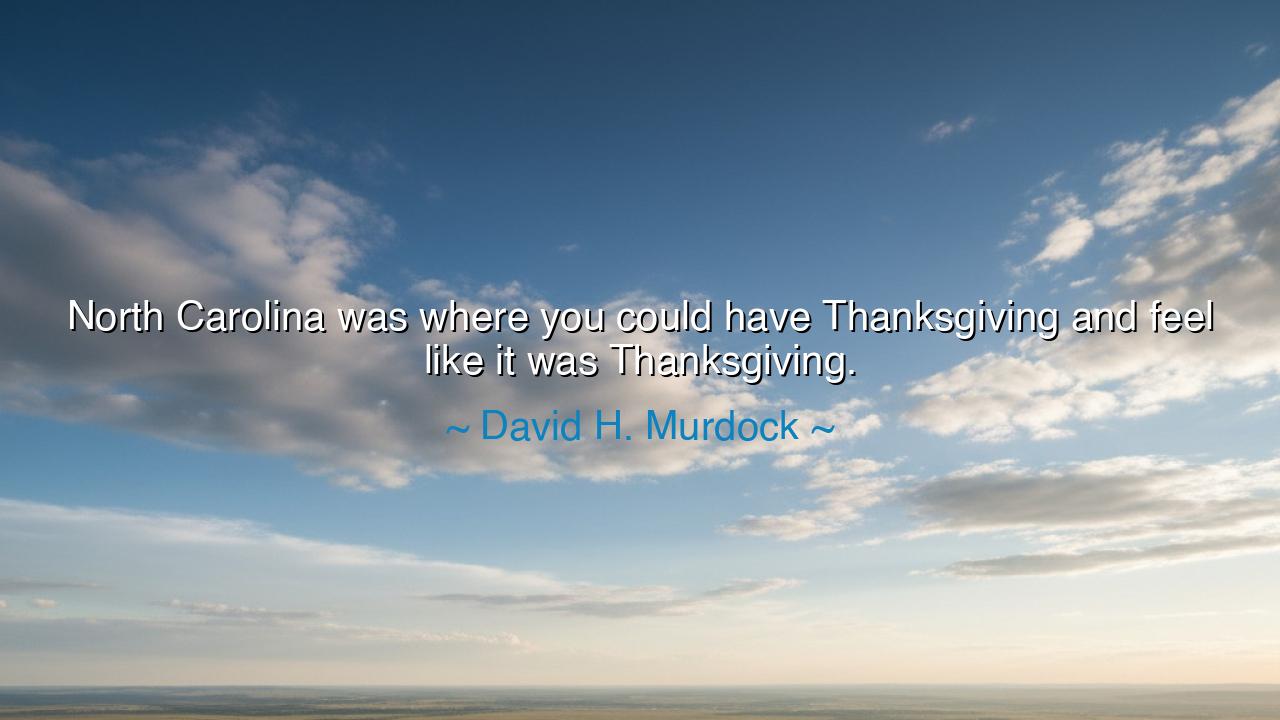
North Carolina was where you could have Thanksgiving and feel
North Carolina was where you could have Thanksgiving and feel like it was Thanksgiving.






David H. Murdock once said with reverent nostalgia: “North Carolina was where you could have Thanksgiving and feel like it was Thanksgiving.” At first, these words appear as a simple memory of place. Yet beneath them lies a profound truth: that certain lands, certain communities, and certain traditions embody the essence of belonging so deeply that the heart recognizes them as home. It is not merely the feast of food, but the feast of atmosphere, of rootedness, of spirit, that makes a holiday authentic.
The origin of this saying rests in Murdock’s own life journey. A businessman who found both success and sorrow, he looked back upon North Carolina not only as a place of residence, but as a place where he felt connected to heritage and meaning. In his mind, Thanksgiving was not an abstract idea nor a hollow ritual, but an embodied experience tied to land, people, and memory. The words reflect a longing for authenticity, a reminder that the truest celebrations cannot be manufactured—they must be rooted in a soil where gratitude flows naturally.
Throughout history, great festivals have always been tied to the land and to the rhythm of nature. In ancient Israel, the people gave thanks at the Feast of Tabernacles, rejoicing in the harvest gathered from the fields. In Europe, harvest festivals united villages in gratitude for grain and fruit, songs and dances echoing the pulse of the earth. Even the first American Thanksgiving in Plymouth was not only about a meal but about survival, harvest, and fellowship between peoples. In each case, the place gave shape to the celebration. Without place, the holiday becomes hollow.
Murdock’s words also remind us that gratitude cannot be separated from environment. To feel Thanksgiving is to feel the embrace of family, the bounty of harvest, the crisp air of autumn, and the sacredness of gathering. It is not simply a date on a calendar, but an atmosphere that surrounds and fills the soul. When he speaks of North Carolina, he speaks of a place where these elements converged to create not just a meal, but a memory—a living picture of what the holiday was meant to be.
Consider also the pilgrims themselves, who in their first feast did not yet have an American tradition but created one. The reason it felt like Thanksgiving was because it was rooted in survival, gratitude, and community. In contrast, when holidays become only rituals of consumption, detached from gratitude and place, they lose their power. Murdock’s reflection is thus a warning: seek not the shell of tradition, but its living heart, for only then will it feel real.
The lesson for us is clear: cherish the places, the people, and the moments that make your celebrations authentic. Do not let holidays be reduced to mere food or commerce. Let them be filled with atmosphere—with nature, with prayer, with laughter, with memory. If you have a place that makes your heart say, “Here, it feels like Thanksgiving,” return to it, honor it, and let it remind you of what matters. And if you do not, create such a place by filling your gatherings with sincerity and gratitude.
So, O listener, take to heart the wisdom of Murdock’s words. Seek not only to have Thanksgiving, but to feel it. Create it with gratitude, protect it from distraction, and root it in love and place. For in the end, true holidays are not measured by abundance of dishes, but by the abundance of meaning. And when you find the place where your soul says, “This feels like home,” there you will have the truest Thanksgiving of all.






AAdministratorAdministrator
Welcome, honored guests. Please leave a comment, we will respond soon